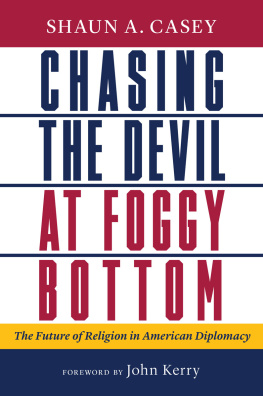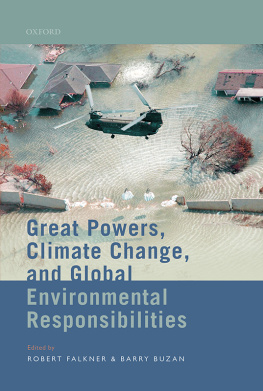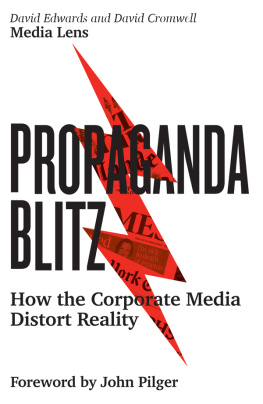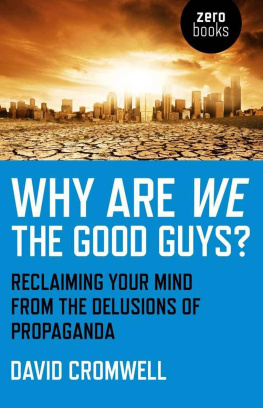Acknowledgements
Id wanted to tackle a book like this for a long time, probably not even being aware of the desire for many years. The book includes several accounts of formative experiences, one from quite an early age, that had me questioning the way society works. But Im sure many people can relate their own, much more impressive, personal examples. In a way, thats the point. Its all too easy to be blind to the fact that many people around us share similar experiences and scepticism about the world presented to us by powerful politicians, business leaders and the media.
The title of the book might seem needlessly provocative. Perhaps in the wake of the war in Iraq, in particular, it challenges an assumption that no longer holds so widely. Moreover, the title could be misconstrued as another example of West-bashing by someone who has benefited from some of the freedoms and privileges that a reasonably comfortable Western lifestyle can confer. And, of course, it should hardly need saying what tremendous strides and achievements have been made over many centuries, if not millennia, in this part of planet Earth.
But Why Are We The Good Guys? is intended as a small counterbalance to the saturation coverage that, for all its admitted faults and shortcomings, the West is necessarily a force for good in the world. A critical and honest appraisal of history and current events is a prerequisite for the prospect of any future progress in human affairs; not least in an era of seemingly endless wars, the ever-present risk of global nuclear conflagration, and the onset of dangerous climate change.
This book would not exist without the encouragement, support and input of many people. I would first like to thank Foske, Sean and Stuart. This time you get top billing; its long overdue. The contribution of David Edwards, stalwart pal and co-editor at Media Lens, has been invaluable; not only in helping to shape material that has appeared under other guises as media alerts or Cogitations, but in providing daily fun and stimulating exchanges as well. Who knew what a couple of pints would lead to!
Since leaving my research job in September 2010 to work full-time on Media Lens, I have been supported by the many kind individuals who donate funds to the website. Im deeply grateful to every single one of you. Support also comes in other forms: the smart and funny people who post on our message board and Facebook page, or email and Tweet us, providing valued thoughts, cogent criticisms, gold-nugget media and book quotes, and useful links to articles; some even send poems, songs and cartoons.
Help, advice, suggestions, inspiration and encouragement have come from too many people to list in full. But here are some of them: John Pilger, Jonathan Cook, Harry Shutt, Edward Herman, David Peterson, Jeffery Klaehn, Suleiman Sharkh, Oren Ben-Dor, Malcolm Levitt, Paul Davis, Gar Alperovitz, Barton Bernstein, Tsuyoshi Hasegawa, Peter Koznick, Uday Mohan, Laurence Lustgarten, Richard Keeble, Fairness and Accuracy In Reporting, Scientists for Global Responsibility, David Smith, Gerry Gold, Paul Feldman, Martin Hart-Landsberg, David Harvey, Adam Blackmore, Kris Temple, Dave Merrington, Glen of League 1 Minus 10, Noam Chomsky, James Hansen, Amena Saleem, Olly Maw, Marianne McKiggan and Mark Levene. Id also like to thank all the journalists who responded to my emails. Whether in the trenches, the bunker or manning the fort, Light-Fingered Fred has been a valiant support. Special mentions to Mum and Bobby, Dad and Eileen, Kenneth, Hilary, Eghan, Ciaran, Imke and Piet, and all members of the McFadyen clan and its various offshoots. Ginger Joe and Felix have been welcome distractions. The early-morning gang of swimmers at the Jubilee Sports Centre deserve recognition too. As does Ed Jackson for dragging me off to the occasional gig and Matt Jones for our joint explorations of various eateries. Id also like to thank everyone involved with Southside AFC as well as my former colleagues at the National Oceanography Centre in Southampton. And thank you to all the teachers and lecturers whove taught and encouraged me over the years. As you will see in Chapter 9, I am very grateful to all those involved in my medical evacuation from RRS Discovery Cruise 227 in 1997 whether at sea, on land or in the air the hospital operation and recovery period in Vigo, Spain, and then a safe return home. Finally, thank you to John Hunt Publishing and Zero Books for being bold enough to publish Why Are We The Good Guys?
Humble and abject apologies if you feel you should have been mentioned and havent. Please twist my arm and make me promise to include you next time. Finally, a heartfelt thanks to you, the reader, for picking up this book.

Contemporary culture has eliminated both the concept of the public and the figure of the intellectual. Former public spaces both physical and cultural are now either derelict or colonized by advertising. A cretinous anti-intellectualism presides, cheerled by expensively educated hacks in the pay of multinational corporations who reassure their bored readers that there is no need to rouse themselves from their interpassive stupor. The informal censorship internalized and propagated by the cultural workers of late capitalism generates a banal conformity that the propaganda chiefs of Stalinism could only ever have dreamt of imposing. Zer0 Books knows that another kind of discourse intellectual without being academic, popular without being populist is not only possible: it is already flourishing, in the regions beyond the striplit malls of so-called mass media and the neurotically bureaucratic halls of the academy. Zer0 is committed to the idea of publishing as a making public of the intellectual. It is convinced that in the unthinking, blandly consensual culture in which we live, critical and engaged theoretical reflection is more important than ever before.
Bibliography
Achbar, Mark (editor). 1994. Manufacturing Consent: Noam Chomsky and the Media , Black Rose Books, Montreal.
Ahmed, Nafeez Mosaddeq. 2010. A Users Guide to the Crisis of Civilization: And How to Save It , Pluto Press, London.
Alford, Matthew. 2010. Reel Power: Hollywood Cinema and American Supremacy , Pluto Books, London.
Alperovitz, Gar. 1995/1996. The Decision to Use the Atomic Bomb, Vintage Books, New York.
Aurelius, Marcus. 2003. Meditations, translation by Gregory Hays, Phoenix, London.
Bakan, Joel . 2004. The Corporation: The Pathological Pursuit of Profit and Power, Constable, London.
Baker, Nicholson. 2008. Human Smoke: The Beginnings of World War II, the End of Civilization , Simon and Schuster, London.
Balanya, Blen, Ann Doherty, Olivier Hoedeman, Adam Maanit and Erik Wesselius. 2000. Europe, Inc.: Regional and Global Restructuring and the Rise of Corporate Power , Pluto Press, London.
Beck, Aaron T. 1999/2000. Prisoners of Hate. The Cognitive Basis of Anger, Hostility, and Violence, Perennial, New York.
Beder, Sharon, with Wendy Vaney and Richard Gosden. 2009. This Little Kiddy Went to Market: The Corporate Capture of Childhood, Pluto Press, London.
Begley, Sharon. 2007. Train Your Mind, Change Your Brain: How a New Science Reveals Our Extraordinary Potential to Transform Ourselves , Ballantine Books.
Berry, David and John Theobald (editors). 2006. Radical Mass Media Criticism: A Cultural Genealogy , Black Rose Books, Montreal.
Blakeley, Ruth. 2009. State Terrorism and Neoliberalism: The North in the South , Routledge, London.
Blum, William. 2003. Killing Hope: U.S. Military and C.I.A. interventions since WWII , updated edition, Common Courage Press, Monroe, Maine.









